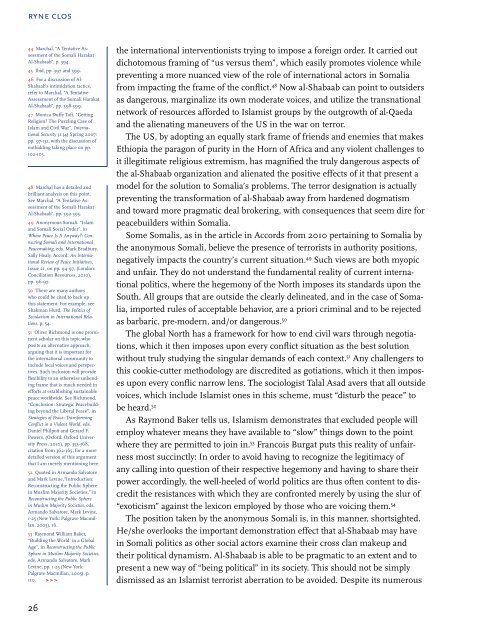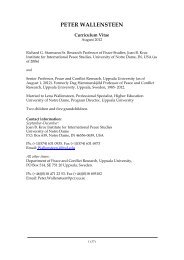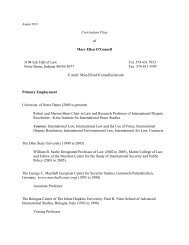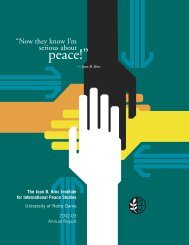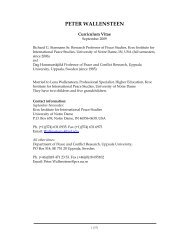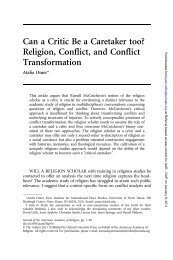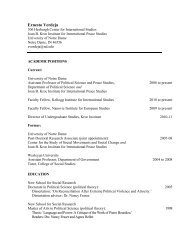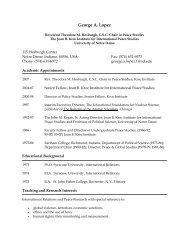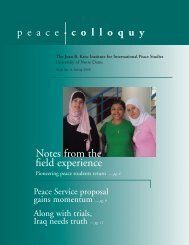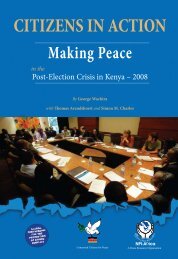Somalia: Creating Space for Fresh Approaches to Peacebuilding
Somalia: Creating Space for Fresh Approaches to Peacebuilding
Somalia: Creating Space for Fresh Approaches to Peacebuilding
You also want an ePaper? Increase the reach of your titles
YUMPU automatically turns print PDFs into web optimized ePapers that Google loves.
yne clos<br />
44 Marchal, “A Tentative Assessment<br />
of the Somali Harakat<br />
Al-Shabaab”, p. 394.<br />
45 Ibid, pp. 397 and 399.<br />
46 For a discussion of Al-<br />
Shabaab’s intimidation tactics,<br />
refer <strong>to</strong> Marchal, “A Tentative<br />
Assessment of the Somali Harakat<br />
Al-Shabaab”, pp. 398-399.<br />
47 Monica Duffy Toft, “Getting<br />
Religion? The Puzzling Case of<br />
Islam and Civil War”, International<br />
Security 31 (4) Spring 2007:<br />
pp. 97-131, with the discussion of<br />
outbidding taking place on pp.<br />
102-103.<br />
48 Marchal has a detailed and<br />
brilliant analysis on this point.<br />
See Marchal, “A Tentative Assessment<br />
of the Somali Harakat<br />
Al-Shabaab”, pp. 392-395.<br />
49 Anonymous Somali. “Islam<br />
and Somali Social Order”, in<br />
Whose Peace Is It Anyway?: Connecting<br />
Somali and International<br />
Peacemaking, eds. Mark Bradbury,<br />
Sally Healy, Accord: An International<br />
Review of Peace Initiatives,<br />
Issue 21, on pp. 94-97, (London:<br />
Conciliation Resources, 2010),<br />
pp. 96-97.<br />
50 There are many authors<br />
who could be cited <strong>to</strong> back up<br />
this statement. For example, see<br />
Shakman Hurd, The Politics of<br />
Secularism in International Relations,<br />
p. 54.<br />
51 Oliver Richmond is one prominent<br />
scholar on this <strong>to</strong>pic who<br />
posits an alternative approach,<br />
arguing that it is important <strong>for</strong><br />
the international community <strong>to</strong><br />
include local voices and perspectives.<br />
Such inclusion will provide<br />
flexibility <strong>to</strong> an otherwise unbending<br />
frame that is much needed in<br />
ef<strong>for</strong>ts at establishing sustainable<br />
peace worldwide. See Richmond,<br />
“Conclusion: Strategic <strong>Peacebuilding</strong><br />
beyond the Liberal Peace”, in<br />
Strategies of Peace: Trans<strong>for</strong>ming<br />
Conflict in a Violent World, eds.<br />
Daniel Philpott and Gerard F.<br />
Powers, (Ox<strong>for</strong>d: Ox<strong>for</strong>d University<br />
Press, 2010), pp. 353-368,<br />
citation from 362-365, <strong>for</strong> a more<br />
detailed version of this argument<br />
that I am merely mentioning here.<br />
52 Quoted in Armando Salva<strong>to</strong>re<br />
and Mark Levine,“Introduction:<br />
Reconstructing the Public Sphere<br />
in Muslim Majority Societies,” in<br />
Reconstructing the Public Sphere<br />
in Muslim Majority Societies, eds.<br />
Armando Salva<strong>to</strong>re, Mark Levine,<br />
1-25 (New York: Palgrave Macmillan,<br />
2005), 16.<br />
53 Raymond William Baker,<br />
“Building the World’ in a Global<br />
Age”, in Reconstructing the Public<br />
Sphere in Muslim Majority Societies,<br />
eds. Armando Salva<strong>to</strong>re, Mark<br />
Levine, pp. 1-25 (New York:<br />
Palgrave Macmillan, 2005), p.<br />
110. > > ><br />
26<br />
the international interventionists trying <strong>to</strong> impose a <strong>for</strong>eign order. It carried out<br />
dicho<strong>to</strong>mous framing of “us versus them”, which easily promotes violence while<br />
preventing a more nuanced view of the role of international ac<strong>to</strong>rs in <strong>Somalia</strong><br />
from impacting the frame of the conflict. 48 Now al-Shabaab can point <strong>to</strong> outsiders<br />
as dangerous, marginalize its own moderate voices, and utilize the trans national<br />
network of resources af<strong>for</strong>ded <strong>to</strong> Islamist groups by the outgrowth of al-Qaeda<br />
and the alienating maneuvers of the US in the war on terror.<br />
The US, by adopting an equally stark frame of friends and enemies that makes<br />
Ethiopia the paragon of purity in the Horn of Africa and any violent challenges <strong>to</strong><br />
it illegitimate religious extremism, has magnified the truly dangerous aspects of<br />
the al-Shabaab organization and alienated the positive effects of it that present a<br />
model <strong>for</strong> the solution <strong>to</strong> <strong>Somalia</strong>’s problems. The terror designation is actually<br />
preventing the trans<strong>for</strong>mation of al-Shabaab away from hardened dogmatism<br />
and <strong>to</strong>ward more pragmatic deal brokering, with consequences that seem dire <strong>for</strong><br />
peacebuilders within <strong>Somalia</strong>.<br />
Some Somalis, as in the article in Accords from 2010 pertaining <strong>to</strong> <strong>Somalia</strong> by<br />
the anonymous Somali, believe the presence of terrorists in authority positions,<br />
negatively impacts the country’s current situation. 49 Such views are both myopic<br />
and unfair. They do not understand the fundamental reality of current international<br />
politics, where the hegemony of the North imposes its standards upon the<br />
South. All groups that are outside the clearly delineated, and in the case of <strong>Somalia</strong>,<br />
imported rules of acceptable behavior, are a priori criminal and <strong>to</strong> be rejected<br />
as barbaric, pre-modern, and/or dangerous. 50<br />
The global North has a framework <strong>for</strong> how <strong>to</strong> end civil wars through negotiations,<br />
which it then imposes upon every conflict situation as the best solution<br />
without truly studying the singular demands of each context. 51 Any challengers <strong>to</strong><br />
this cookie-cutter methodology are discredited as gotiations, which it then imposes<br />
upon every conflic narrow lens. The sociologist Talal Asad avers that all outside<br />
voices, which include Islamist ones in this scheme, must “disturb the peace” <strong>to</strong><br />
be heard. 52<br />
As Raymond Baker tells us, Islamism demonstrates that excluded people will<br />
employ whatever means they have available <strong>to</strong> “slow” things down <strong>to</strong> the point<br />
where they are permitted <strong>to</strong> join in. 53 Francois Burgat puts this reality of unfairness<br />
most succinctly: In order <strong>to</strong> avoid having <strong>to</strong> recognize the legitimacy of<br />
any calling in<strong>to</strong> question of their respective hegemony and having <strong>to</strong> share their<br />
power accordingly, the well-heeled of world politics are thus often content <strong>to</strong> discredit<br />
the resistances with which they are confronted merely by using the slur of<br />
“exoticism” against the lexicon employed by those who are voicing them. 54<br />
The position taken by the anonymous Somali is, in this manner, shortsighted.<br />
He/she overlooks the important demonstration effect that al-Shabaab may have<br />
in Somali politics as other social ac<strong>to</strong>rs examine their cross clan makeup and<br />
their political dynamism. Al-Shabaab is able <strong>to</strong> be pragmatic <strong>to</strong> an extent and <strong>to</strong><br />
present a new way of “being political” in its society. This should not be simply<br />
dismissed as an Islamist terrorist aberration <strong>to</strong> be avoided. Despite its numerous


